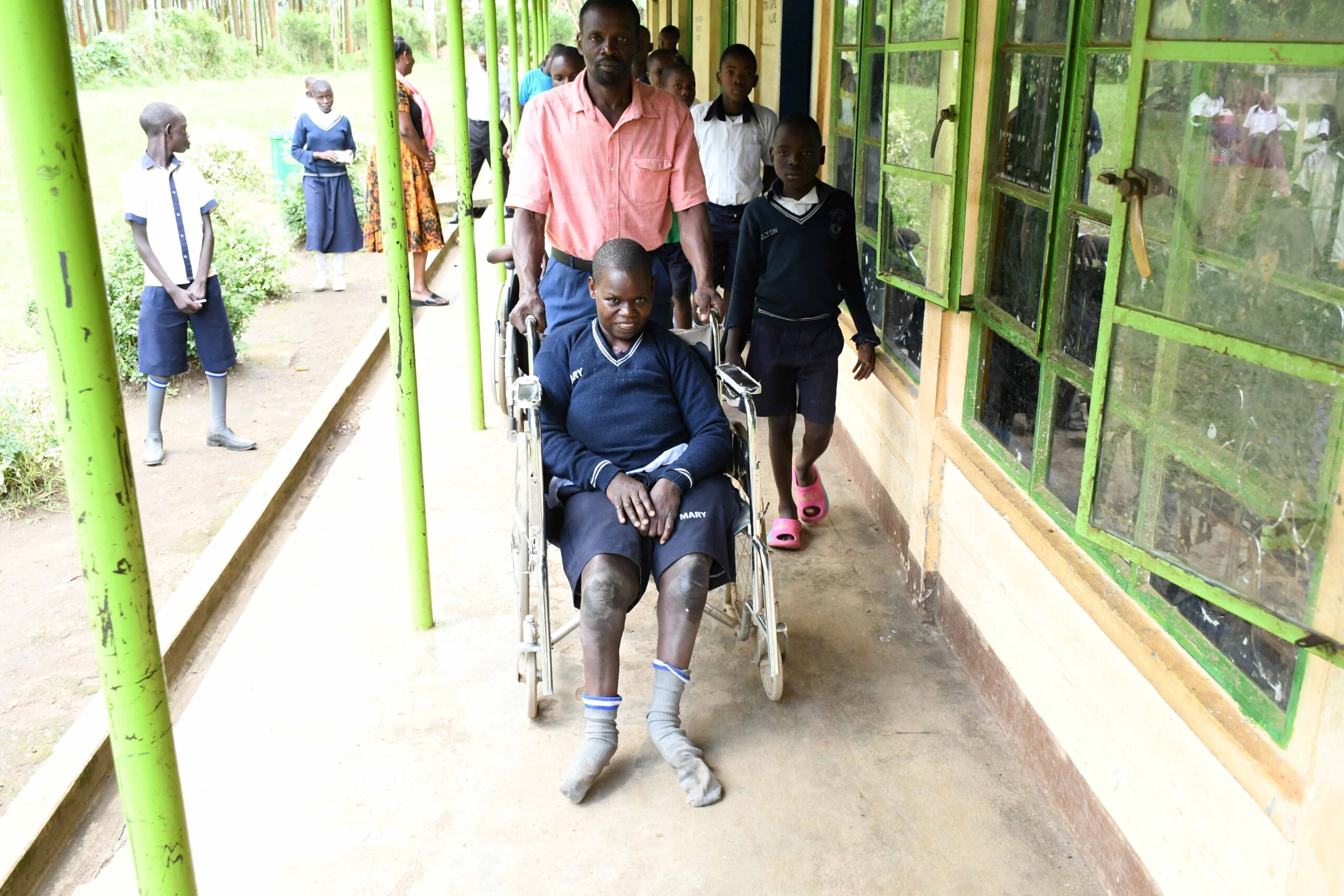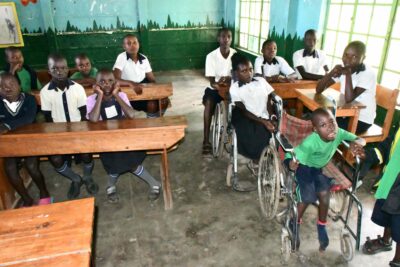
Inside Special Needs Classroom, how teachers spend their day
Betty Mujungu.
By 7:30 a.m., Ms Juliet Tibasaaga is already at school, at St Peters and Paul Primary School located in Fort Portal City preparing her classroom. It is marked with the letters “SNE” on the door, designating it as the space for Special Needs Education.
Every morning, she makes sure the classroom is clean, organized, and welcoming, arranging desks, tidying up, and making sure that when her pupils arrive, they are met with a warm, structured environment.
Ms Tibasaaga’s pupils, around 35 in total, all have unique needs; some are deaf, while others have cognitive disabilities. While some arrive with their parents, others are left at the school gate and Ms Tibasanga goes out of her way to greet each student as they enter, often picking up those whose parents drop them at the gate.
“When these pupils arrive each morning, we are already in the classroom, waiting to welcome them. Some parents just drop them off at the school gate, and we have to go and bring them in, which shows that some parents are not fully responsible for their children,” She said.
 Ms. Tibasaaga inside her classroom, keeping the special needs pupils together during break.
Ms. Tibasaaga inside her classroom, keeping the special needs pupils together during break.
She notices the varied levels of parental involvement, sometimes sensing that some parents struggle with the responsibility of caring for their special needs children.
The school day starts with an assembly, but Ms Tibasanga’s class does not attend. Assemblies can be overwhelming for some of her pupils, especially those with severe disabilities who might become distressed or distracted.
For pupils who are deaf, communication at such gatherings is also a challenge, requiring a sign language interpreter. Instead, they stay in the classroom, and after the assembly, a teacher comes to share important announcements in a way that they can understand.
As her pupils settle in, Ms Tibasanga begins each day with a focus on personal hygiene, which is vital for her class.
Many of her students need a little extra help; some wet themselves, while others need assistance with washing up before they eat anything. With gentle patience, she attends to these needs, making sure they are comfortable and ready to learn.
The teaching style in Ms Tibasaaga’s classroom is not traditional or purely academic. Here, she says learning is centered on life skills, sensory activities, and creative expression. She believes in nurturing her pupils’ general knowledge and self-confidence first, with academics following naturally.
Throughout the day, she leads activities designed to engage their senses and stimulate their creativity. Deaf students may express themselves through dance or drawing, while others participate in music, rhythm exercises, and movement.
With limited space and resources, all pupils learn together in one room, regardless of their grade level.
She says while they progress in understanding and skills, they remain in the same class, forming a unique community where pupils recognize one another by name and by ability rather than by academic level.
When it comes to academic lessons, Ms Tibasaaga adjusts her teaching methods to match her pupils’ needs. She uses sign language for her deaf students, writes instructions on the blackboard for some, and provides individual help for others who need more guidance in their exercise books.
“There are some pupils for whom we write instructions on the blackboard, while for others, we write directly in their books. We use sign language in class because some students are deaf, and we make sure they understand what we have taught. Afterward, we mark their books to assess how well they have performed.”
Her dedication goes beyond lesson plans and textbooks; it is a commitment to nurturing a community where each child feels seen, valued, and capable.
During break time, the school provides porridge for the students in Ms. Juliet Tibasanga’s special needs classroom also some pupils bring packed drinks from home, but they can easily forget about them but use the same time to make sure these drinks are given at the right time, understanding that if they overlook this, the students may miss out.
Unlike other pupils who go outside for play, her pupils remain in the classroom, where Ms. Tibasanga and her fellow teachers stay with them to ensure everything remains calm and safe.
The teachers take turns stepping out to make sure someone is always present; some of the pupils can be quick to act out, especially if they feel frustrated or misunderstood.
“We don’t let them mix with other pupils at break time, some of them, due to their conditions, can get too wild and might end up fighting others. We let the other pupils finish their break first, and then we escort our pupils outside to play,”
When it’s time for their break after others have gone back to class, the teachers provide a selection of engaging activities. The children enjoy playing with balls, riding small bicycles, or, while others watch TV channels that hold their attention and keep them engaged.
She said together with her co-teacher, they try to create a structured, comforting environment, often going above and beyond their typical roles. “We are like their parents here, something not common with other teachers,”
When lunchtime comes, the teachers have another task: arranging meals for the pupils. Since the school does not provide lunch, parents usually send money for their children’s meals from the canteen.
For those who forget, it’s up to the teachers to contact the parents and remind them to send funds. The teachers then buy food from the canteen for the pupils, making sure each one is cared for.
At the end of the day, Ms Tibasaaga and her colleague, Ms Van Nyakake, often stay as late as 7 p.m.
While most parents arrive on time, there are occasions when a parent is delayed, and the teachers wait with the pupils until they are safely picked up.
At Canon Apollo Demo Primary School, 75 pupils with special needs are nurtured with exceptional care and dedication by two devoted teachers, Mr Godfrey Tindyebwa and Mr Musinguzi Zaccheaus.
 some of the Special needs pupils at Canon Apollo in class.
some of the Special needs pupils at Canon Apollo in class.
Each day, they provide specialized support for pupils with diverse abilities, including auditory and visual impairments, intellectual disabilities, and other challenges.
Mr. Tindyebwa, who has taught at the school since 1999, begins each morning by arranging essential learning aids—visual aids, sensory tools, sign language flashcards, and other resources tailored to engage students with specific needs.
As pupils arrive, he takes time to personally greet each one, using waves, signs, or gestures to make every child feel welcomed. This morning ritual helps him gauge each student’s mood and energy level, allowing him to anticipate any challenges they might face that day.
Losing one eye in his fourth year of primary school, Mr Tindyebwa was inspired to pursue a career in teaching, dedicating his life to helping students with special needs. His journey has come full circle as he watches some of his former pupils graduate with advanced degrees, a point of pride in his long career.
“I’ve taught pupils here who have gone on to earn master’s degrees. I’m very proud of that,” he says. “Some teachers don’t want to be posted here, but I feel a calling to stay. This year, I have three candidates who will sit for the Primary Leaving Examinations (PLE),” he said.
Due to the Ministry of Education’s inclusion policy, the special needs pupils attend some classes with their peers, fostering a more inclusive environment.
However, they also have designated sessions where they receive tailored instruction in skills like sign language, storytelling, and self-help techniques.
Mr Tindyebwa explains that all teachers at the school are known to these students by a unique “sign name,” making communication accessible and helping the children feel a part of the school community.
Supporting Mr Tidyebwa is Mr Musinguzi Zaccheaus, who has taught at the school for over 10 years.
“When it’s their class time, we give them full attention,” he says. “We want them to become good citizens. Many of our students have gone on to become carpenters and business owners.”
Fellow pupils often help them with activities like playing in wheelchairs, ensuring they feel included and valued. This camaraderie, nurtured by the teachers, reflects the school’s commitment to fostering a community of acceptance and empathy.
Through the dedication of teachers like Mr Tindyebwa and Mr Musinguzi, Canon Apollo Demo Primary School has become a nurturing space where special needs pupils are supported to reach their fullest potential, not just academically but in personal growth and self-confidence.


